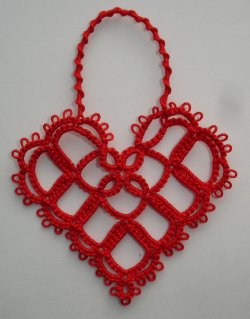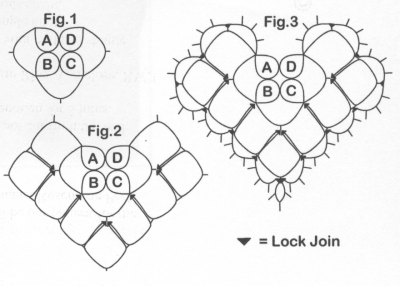‹ Patterns
Rosemarie Peel
Rosemarie's Heart (© Rosemarie Peel, 2007)


Method:
Wind 3 yards of red thread onto a shuttle and do not cut from the ball.
Make the picot on the first ring (Ring A), large enough for 3 joins.
Ring A 6 - 6 close, Reverse Work (RW)
[Chain 6 - 6, RW, Rings B, C and D in turn 6 + (to Ring A) 6 close, RW,] 3 times. (Fig.1)
The next row goes back in the other direction so your ball and shuttle threads need to be swapped by tying them in a single knot.
Chain 6 - 6 - 6, Lock Join (LJ) to picot on previous chain,
Fig.2 shows where the joins are made.
Chain 6 + 6 - 6 - 6, LJ to same place as last LJ,
Chain 6 + 6 - 6 , LJ to close-up point of Ring C.
Continue round with Fig.2 as a guide.
Chain 6 + 6 - 6 , LJ,
Chain 6 + 6 - 6 - 6 , LJ to same place as last LJ,
Chain 6 + 6 - 6 , LJ,
Chain 6 + 6 - 6 , LJ,
Chain 6 + 6 - 6 - 6 , LJ to same place as last LJ,
Chain 6 + 6 - 6 , LJ,
Turn work and tie another single knot to swap the threads over.
Work 15 × Chain 2 - 2 - 2 - 2 round the outside of the heart, LJing after
each 6 ds section on the row beneath and using the same picot twice
at the bottom of the heart. (see Fig.3)
Fasten off to the close-up point of Ring D.
This heart can be used to appliqué on card or fabric. Add a handle to hang it, for example, on a button. Gold beads could be added to the last round.
Handle - Make a twisted chain using only the second half of the ds, rotate after every 5 for the desired length and attach as shown in photo.
Beads - Put 45 beads on the ball thread before winding the shuttle. Put them into the work on the last round in place of the picots.
Basket - The handle on this heart makes you think of a little basket, and Julie Patterson from Australia tried this out, joining the second heart to the first by the outer picots. Rosemarie suggests: "If the second row is repeated (with more repeats on the sides) a bigger heart, and therefore a more useful basket, can be made."
See here for Abbreviations.